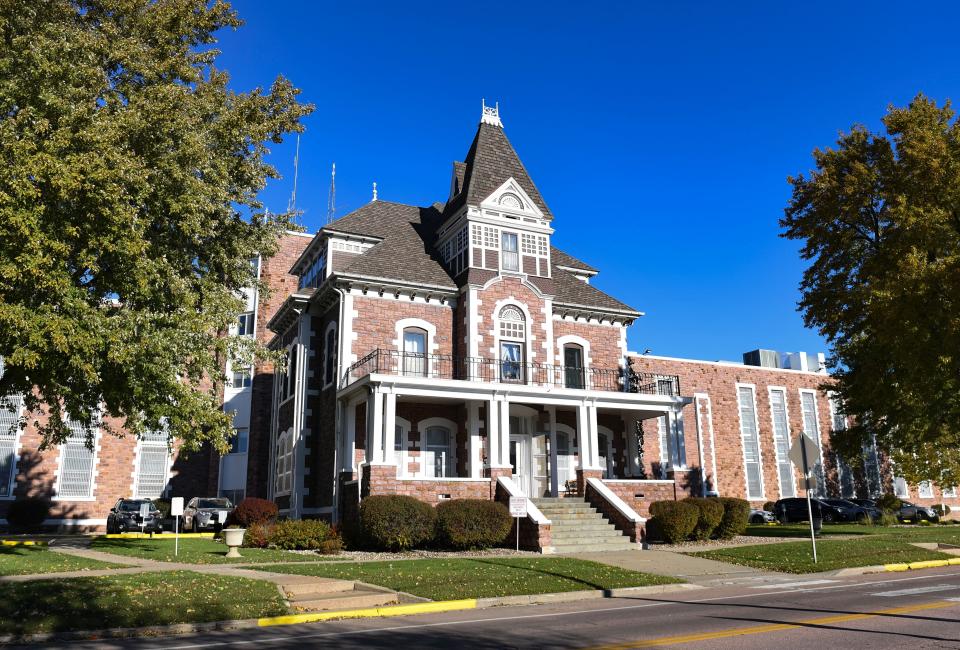'Truth in Sentencing' bill that would alter sentencing for violent offenders advances to House floor
- Oops!Something went wrong.Please try again later.
PIERRE — A bill that would fundamentally change sentencing guidelines for people convicted of violent crimes has advanced to the House floor after a 7-6 vote in a House committee Wednesday.
SB 146, sponsored by Sen. Brent Hoffman, R-Sioux Falls, would require people convicted of serious violent crimes to serve either all or a majority of their sentence, before being eligible for supervised release or parole. The bill sailed through the Senate 31-3.
And while Hoffman's argument the state needs to get tougher in crime to address a rise of violent crime, mostly involving parole absconders, it was Rep. Tim Reisch, R-Howard, a former Secretary of Corrections, who told the House Judiciary Committee there were better ways to address the issue.
More:South Dakota lawmakers want to tighten how the state handles parole eligibility
The two-part bill, heavily supported by the state's Sheriff's Association, the state's Police Chief's Association, the State's Attorney Association and the Attorney General's office, was criticized because of the argument serious offenders once released would not be supervised.
In the first section of the bill, anyone convicted of one of 13 high level violent crimes, such as first-degree manslaughter and first-degree human trafficking, would have to serve the full sentence imposed on them by a judge without credits for a shortened term. The inmate would then be eligible for supervised release.
In the second section, those convicted of one of 10 other violent crimes, such as aggravated assault or second-degree manslaughter, could receive credits that could be applied toward shortening their sentence. However, they must serve at least 85% of their sentence before becoming parole eligible.
Reisch, who served as the Corrections Secretary for eight years under the Rounds and Daugaard administrations as well as temporarily in 2021, stressed the prison system in the state was already "bursting at the seams" and it seemed the problem laid with the parole system.
"The sponsor of this bill is of the opinion that imposing prison sentences with limited chance of parole for a long list of crimes will serve as a deterrent," Reisch said. "The reality of the fact is the length of sentences really don't serve as deterrence. Criminals aren't thinking about the length of the sentence they might get. They're thinking about, 'Am I gonna get caught or not?'"
More:Technical parole violations in South Dakota are 'very high,' DOC Secretary Kellie Wasko
At the same time the House judiciary committee was meeting, the joint appropriations committee voted to approve funding for projects to build a new women's prison in Rapid City and purchase land for a new men's prison in Sioux Falls.
Attorney General Marty Jackley said in committee the bill was the first step toward what happened on the federal level many years ago when the feds did away with the parole system. He added the bill gave discretion to the courts and the Board of Parole and Pardons when it came to supervised release.
"I think providing the discretion to the court that this bill does will help that transitioning from an archaic parole system closer to what the federal system (has) found to work," he said.
Others on the committee, like Rep. Scott Odenbach, R-Spearfish, questioned if the bill would repeal efforts the Legislature made in 2013 when it passed SB 70, known as the South Dakota Public Safety Improvement Act, which greatly changed the criminal justice system in the state.

"I think this fits within what was trying to be done in Senate Bill 70, but was not accomplished," Jackley said. "I don't feel that this prevents that important goal of more treatment, more supervision and early release programs."
However, it was the part about offenders not being able to receive credit for attending programming that drew the concern from opponents of the bill, such as Justin Bell, a lobbyist for the South Dakota Association for Criminal Defense Lawyers.
Bell added in other states where similar policies had been enacted, the prison population increased and the policy directly impacted minorities.
"You see a significant disproportionate effect on minority populations. In a lot of states that have done this, it ends up being the African American community," he said. "In South Dakota, (it) would likely be the Native American community."
As an example; Native Americans disproportionally serve longer manslaughter sentences in South Dakota, according to an Argus Leader analysis. Manslaughter would be included in the two sections of the 'Truth in Sentencing' bill if passed into law.
More:South Dakota House advances mandatory minimums for drunken driving
The Legislative Research Council found that the Department of Corrections would be expected to spend $21 million over 26 years if SB 146 passed.
Rep. Mary Fitzgerald, R-Saint Onge, said it was the responsibility of the Legislature to protect the safety of South Dakotans.
Reisch agreed, but said there needed to be alternative to the bill.
"There's a difference between being tough on crime and passing bills that make us feel good, but have no real effect on recidivism. This bill is the latter," he said. "We need more parole agents. We need parole agents probably to do a better job. I think a better alternative (to) this bill is something that would tighten the grid on parole revocations."
SB 146 now heads to the House floor for debate. If passed, the bill will go to Gov. Kristi Noem's desk for final approval.
This article originally appeared on Sioux Falls Argus Leader: Bill that would change sentencing for violent felons in South Dakota advances

